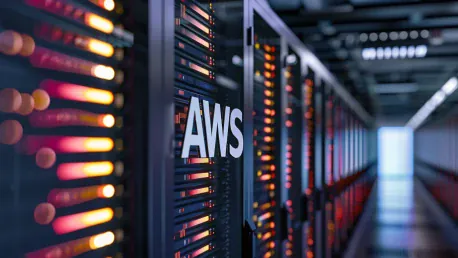In an era where environmental responsibility has become a corporate mandate, Amazon Web Services (AWS) is leading the charge in sustainable datacenter practices. Through its emphasis on the circular economy, AWS is redefining how datacenter hardware is reused, recycled, and ultimately revitalized. This commitment testifies to AWS’s determination to mitigate environmental impacts while meeting growing demands for cloud services. By implementing pioneering initiatives, AWS is showing that technological advancement and environmental sustainability can coexist harmoniously.
The principle of the circular economy is at the heart of AWS’s sustainability efforts. In a circular economy, products and materials are designed to be reused, refurbished, and recycled, creating a closed-loop system that minimizes waste and conserves resources. AWS’s focus on reusing and recycling datacenter hardware exemplifies this approach. By deconstructing servers and network equipment to salvage reusable parts and extract precious metals, AWS significantly reduces the need for new raw materials. This process not only conserves natural resources but also reduces energy consumption and greenhouse gas emissions.
AWS Launches Reverse Logistics Facility in Dublin
AWS has taken a significant step in its sustainability journey by opening a reverse logistics facility in Dublin, Ireland. This facility, operated by AWS’s Re:Cycle Reverse Logistics subsidiary, is the first of its kind outside the United States. The establishment of this facility underscores AWS’s commitment to minimizing electronic waste and promoting the circular economy. Through this innovative approach, AWS aims to set an unprecedented standard for datacenter operations across the globe.
The Dublin location focuses on deconstructing servers and network hardware to salvage reusable parts and extract precious metals. This initiative is part of Amazon’s broader strategy to support a circular economy, reducing the need for new components and conserving raw materials. By refurbishing and reusing parts, AWS is also significantly lowering its carbon footprint and energy consumption. The facility employs advanced technologies and processes to ensure that every component is either reused or recycled, demonstrating a meticulous approach to sustainability.
Amazon’s Net-Zero Carbon Emissions Goal
The reverse logistics facility in Dublin aligns seamlessly with Amazon’s broader sustainability goals. A pivotal aspect of AWS’s mission is achieving net-zero carbon emissions. By reusing and recycling datacenter hardware, AWS lessens the environmental impact associated with producing new components. This approach not only conserves resources but also supports AWS’s ambitious carbon neutrality targets. Moreover, the facility’s operations are designed to be as energy-efficient as possible, further enhancing its environmental benefits.
AWS employs a stringent zero-waste policy where any waste generated from the recycling process does not end up in landfills. Instead, AWS ensures that unavoidable waste undergoes high-end recycling processes. This zero-waste initiative underscores AWS’s commitment to sustainability and environmental stewardship, marking a significant milestone in Amazon’s journey towards net-zero carbon emissions. The facility’s focus on both reusing and responsibly disposing of waste reflects a holistic approach to sustainability that considers the entire lifecycle of datacenter hardware.
Socio-Economic Impact in Ireland
The new reverse logistics facility in Dublin is not just a win for the environment; it also brings substantial economic benefits to Ireland. The facility has led to the creation of 850 new jobs, encompassing roles in operations, logistics, and recycling. This job creation is a testament to the economic impact of AWS’s sustainability initiatives. The influx of new employment opportunities strengthens local communities and contributes to the overall economic health of the region.
Ireland’s Green Party leader and Minister for Children, Equality, Disability, Integration, and Youth, Roderic O’Gorman, inaugurated the facility, emphasizing the country’s role in the circular economy. O’Gorman praised the skill and dedication of the workers and highlighted the project’s contribution to Ireland’s reputation as a leader in sustainability. This initiative not only helps AWS meet its environmental goals but also fosters economic growth and supports Ireland’s climate objectives. The government’s endorsement of the facility underscores the importance of public-private partnerships in achieving sustainability targets.
Global Impact and Achievements
AWS’s recycling efforts extend far beyond Ireland, showcasing a significant global impact. In 2023 alone, AWS diverted 14.6 million hardware components from landfills worldwide through its recycling initiatives. This global footprint underscores the importance of AWS’s innovative recycling programs in environmental conservation. By implementing these initiatives on a large scale, AWS demonstrates the feasibility and effectiveness of sustainable practices in the tech industry.
These achievements illustrate the broader implications of AWS’s commitment to the circular economy. By implementing these initiatives at scale, AWS sets a powerful precedent in the tech industry, demonstrating that technological advancements and sustainability can coexist harmoniously. The success of these programs helps mitigate environmental impacts, foster economic growth, and contribute to a more sustainable future. AWS’s global impact is a testament to the scalability of sustainable practices and their ability to drive significant positive change.
Circular Economy in Datacenter Operations
In an age where environmental responsibility is a corporate necessity, Amazon Web Services (AWS) is at the forefront of sustainable datacenter practices. Focusing on the circular economy, AWS is revolutionizing how datacenter hardware is reused, recycled, and revitalized. This dedication underscores AWS’s commitment to reducing environmental impacts while catering to the growing demand for cloud services. By adopting pioneering initiatives, AWS is proving that technological progress and environmental sustainability can coexist.
The circular economy is central to AWS’s sustainability strategy. This model ensures products and materials are reused, refurbished, and recycled, forming a closed-loop system that cuts waste and conserves resources. AWS exemplifies this by reusing and recycling datacenter hardware. By dismantling servers and network equipment to recover reusable parts and extract precious metals, AWS lessens the reliance on new raw materials. This effort not only preserves natural resources but also lowers energy usage and greenhouse gas emissions, highlighting a harmonious blend of innovation and environmental care.









